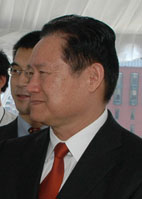Members of the privileged families of the party–state are escaping China’s current anti-corruption campaign, writes GEREMIE R. BARME.
Tyger! Tyger! burning bright
In the forests of the night,
What immortal hand or eye
Could frame thy fearful symmetry?
—William Blake
By September 2014, some 48 high-level Chinese Communist Party cadres, military officials and party–state bureaucrats—that is, those ranked at deputy provincial level/ ministry level and higher—had been swept up in the vaunted Xi Jinping–Wang Qishan post-18th Party Congress anti-corruption campaign. By that time, the highest-level targets of the purge were the Hu-Wen-era Party Politburo member Zhou Yongkang (pictured) and the People’s Liberation Army general Xu Caihou.

It is noteworthy that all 48 ‘tigers’—high-level corrupt officials—are reportedly from ‘commoner’ families. Most are from peasant or similarly humble origins; none are easily identified as being members of what is known as the ‘Red Second Generation’—the children of the founding Communist Party fathers and mothers of the Yan’an era and early People’s Republic, nor from the Bureaucrat Second Generation—the children of members of the first generation of representat-ives/bureaucrats selected to join the inaugural convocations of the National People’s Congress or the National People’s Political Consultative Committee, both founded in 1954.
In the murky corridors of Communist power, an impressive number of party gentry progeny, or the offspring of the Mao-era nomenclatura, have been implicated in corrupt practices, but word has it that, like the well-connected elites of other climes, they’ve enjoyed a soft landing—being discreetly relocated, shunted into delicate retirement or quietly ‘redeployed’. It’s all very comfy; and it’s all very much business as usual.
What has been extraordinary about the Xi–Wang anti-corruption purge is not so much its style or extent, but the fact that, after nearly two years, members of the privileged families of the party–state have gone on the record to observe why they are above the grimy business of corruption. Members of this group have been of interest to The China Story Project, a web-based initiative of the Australian government in collaboration with the Australian National University, for some years. I first wrote about them in an article for the June 2011 issue of China Heritage Quarterly titled ‘The children of Yan’an: new words of warning to a prosperous age’ , and again in ‘Red eclipse’, the conclusion to our 2012 China Story Yearbook: Red rising, red eclipse. They feature once more in our upcoming China Story Yearbook 2014: Shared destiny.
Over the years many observers have blithely dismissed these Maoist remnants and treated them, at best, as marginal figures, often deriding them as has-beens. But in the closed system of China, these seemingly defunct members of the ageing party gentry, their fellows and their families, should not be underestimated. The fury that their hauteur and unthinking air of superiority—as demonstrated by some of the following observations on the anti-tiger corruption purge by more outspoken members of China’s Red Gentry—generates within the unconnected party–state bureaucracy and aspirational classes should also not be overlooked.
For example, Ye Xiangzhen, Deputy Head of the All-China Confucius Academy, a member of the fourth-generation film makers and the eldest daughter of Marshall Ye Jianying, one of the founders of the People’s Liberation Army, remarked:
The Red Second Generation witnessed the frugality and struggles of their parent’s generation, the fact that they were willing to shed blood and martyr themselves for the nation. They were profoundly influenced by their fathers and relatively speaking are not easily corruptible.
Zhou Bingde, former Deputy Chief of the China News Agency and niece of Zhou Enlai, commented:
The reason that bureaucrats from a Red Second Generation background are only very rarely involved in corruption is that they have inherited the tradition from their parents of placing the People and the Nation above all.
Xu Xiaoyan, a lieutenant-general in the PLA and daughter of Xu Xiangqian, one of the famed 10 marshals of the Communist Party’s Red Army, remarked:
The Red Second Generation grew up immersed in family admonishments, how could they give in to corruption like those others.
And Tao Siliang, Deputy Director of the China Mayors’ Association, and daughter of the pre-1966 party elder Tao Zhu said:
Through revolution and the heritage of blood our parents bequeathed to us the Red Gene. I don’t believe that this gene will ever lose its lustre, because we will carry it forward. I’m willing to admit that I’m a Red Second Generation because that’s just what I am, the second generation of revolutionaries. It is time for us to play the natural positive role that we have and support General Secretary Xi Jinping in carrying on the anti-corruption campaign to the very end and to pursue reform to the end.
In conclusion, I would observe that, as statist Confucianism enjoys ever-new levels of official support (see, for example, our recent posting, The Confucian return in an age of extremes), any serious student of high Maoism would be reminded of the philosopher Li Zhi — the Ming Dynasty anti-Confucian firebrand—whose key works were reprinted during the mid-1970s anti-Confucius campaign. Among his many bons mots, Li remarked of the morality-sprouting bureaucrats of his day—in particular in his Book to be burnt—that:
They speak of the Way and Morality yet in their hearts they crave lofty position; they are fixated on accumulating prodigious wealth. On the surface they are Moralists, deep down they crave riches; they cloak themselves in the refined garb of the Confucian, but their behaviour is no better than that of dogs and pigs.
This is an edited version of an article posted on the Australian Centre of China in the World website on the 16 October 2014.
Photo:
The 18th Party Congress: signalled the start of the anti-corruption campaign (Wikimedia Commons/VOA).

